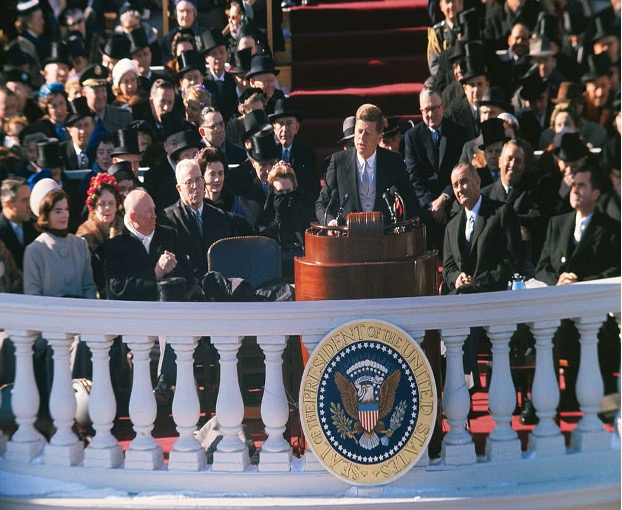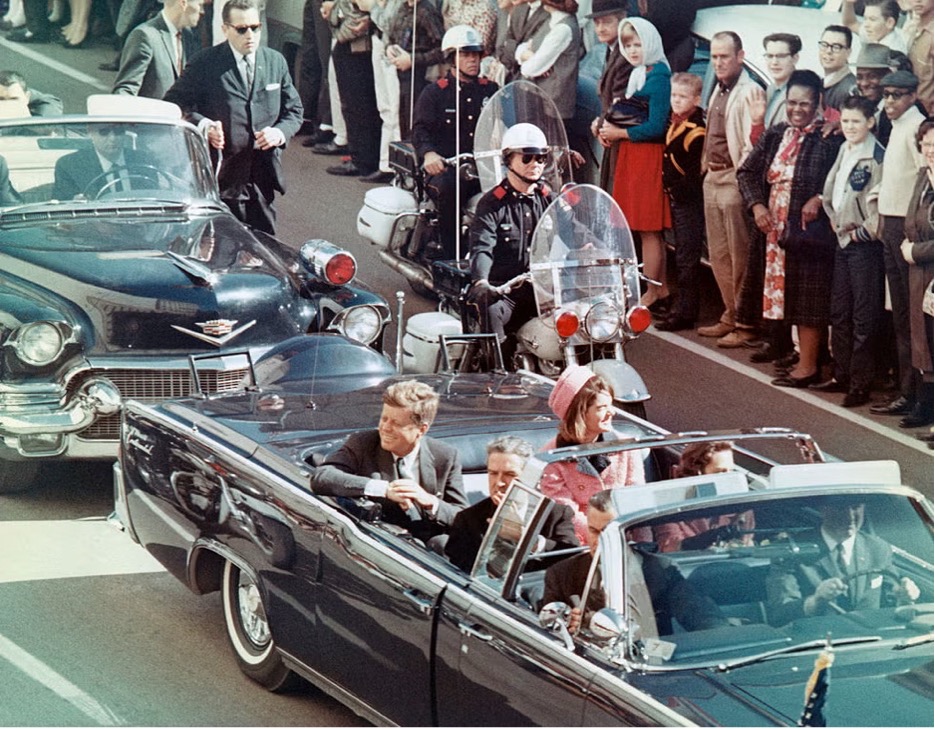The life and assassination of President J F Kennedy was the interesting subject of Sean Szmalc’s presentation to a recent meeting of Largs Probus Club.
John Fitzgerald Kennedy was born on May 29, 1917, in Brookline, Massachusetts, to his mother, Rose (née Fitzgerald) and his father, Joseph Kennedy Sr. Both the Fitzgeralds and the Kennedys were wealthy and prominent Irish Catholic families in Boston. John, nicknamed “Jack,” was the second oldest of a group of nine extraordinary siblings. The Kennedy children remained close-knit and supportive of each other throughout their entire lives.
Despite his father’s cajoling, young Kennedy was a poor student and a mischievous boy. He attended a Catholic boys’ boarding school in Connecticut called Canterbury, where he excelled at English and history—the subjects he enjoyed—but nearly flunked Latin, in which he had no interest. Although he was obviously brilliant, Kennedy remained at best a mediocre student, preferring sports, girls, and practical jokes to coursework.
His father wrote to him by way of encouragement, “If I didn’t really feel you had the goods, I would be most charitable in my attitude toward your failings… I am not expecting too much, and I will not be disappointed if you don’t turn out to be a real genius, but I think you can be a really worthwhile citizen with good judgment and understanding.” John was, in fact, very bookish in high school, reading ceaselessly but not the books his teachers assigned.
He was also chronically ill during his childhood and adolescence; he suffered from severe colds, the flu, scarlet fever, and even more severe, undiagnosed diseases that forced him to miss months of school at a time and occasionally brought him to the brink of death.
After spending one semester at Princeton University, Kennedy transferred to Harvard University in 1936. Shortly after graduating from Harvard, Kennedy joined the U.S. Navy and was assigned to command a patrol torpedo boat in the South Pacific. On August 2, 1943, his boat, PT-109, was rammed by a Japanese warship and split in two. Two sailors died, and Kennedy badly injured his back. The incident earned him the Navy and Marine Corps Medal for “extremely heroic conduct” and a Purple Heart for the injuries he suffered.
JFK entered into politics and represented a working-class Boston district in the U.S. House of Representatives from 1947 to 1953 before being elected to the U.S. Senate from 1953 to 1960. He ran in the 1960 presidential election which turned largely on a series of televised national debates in which Kennedy outshone Nixon, he was an experienced and skilled debater, and appeared relaxed, healthy, and vigorous in contrast to his pallid and tense opponent. On November 8, 1960, Kennedy defeated Nixon by a razor-thin margin to become the 35th president of the United States of America. Kennedy’s election was historic in several respects. At the age of 43, he was the second youngest American president in history, second only to Theodore Roosevelt, who assumed the office at 42. He was also the first Catholic president and the first president born in the 20th century.

Delivering his legendary inaugural address on January 20, 1961, Kennedy sought to inspire all Americans to more active citizenship. “Ask not what your country can do for you,” he famously said. “Ask what you can do for your country.” During his brief tenure as president, Kennedy did much for America.
Kennedy’s greatest accomplishments came in the arena of foreign affairs. Capitalizing on the spirit of activism he had helped to ignite, Kennedy created the Peace Corps by executive order in 1961. By the end of the century, over 170,000 Peace Corps volunteers would serve in 135 countries. Also in 1961, Kennedy created the Alliance for Progress to foster greater economic ties with Latin America, in hopes of alleviating poverty and thwarting the spread of communism in the region.
He served at the height of the Cold War, and the majority of his foreign policy concerned relations with the Nikita Khrushchev of the Soviet Union and Fidel Castro of Cuba. He authorised an effort to overthrow Castro’s government in the failed Bay of Pigs invasion and in 1962 Soviet missiles were seen to be deployed in Cuba. Tensions rose, termed the Cuban Missile Crisis, which could have resulted in nuclear war had Khrushchev not backed down.
Eight months later, in June 1963, Kennedy successfully negotiated the Nuclear Test-Ban Treaty with Great Britain and the Soviet Union, helping to ease Cold War tensions. It was one of his proudest accomplishments.
Sean spoke on the lead up to November 22, 1963, when Kennedy was assassinated in Dallas, highlighting failures on the day including changing the route, not searching high rise buildings along the route and not having security on the cars’ footplates due to Kennedy’s wish to be seen. From an upstairs window of the Texas School Book Depository building, a 24-year-old warehouse worker named Lee Harvey Oswald, a former Marine with Soviet sympathies, fired at the car, hitting the president twice. Kennedy died at Dallas’ Parkland Memorial Hospital shortly afterwards at the age of 46. Oswald was arrested for the assassination, but he was shot and killed by Jack Ruby before he could be questioned in detail. The FBI and the Warren Commission both concluded Oswald had acted alone, but conspiracy theories about the assassination persist, Sean highlighting a number of them including the possibility of three assassins with shots from the Book Depository, Del-Tex Building and the grassy knoll.

JFK ranks highly in polls of U.S. presidents with historians and the general public, despite sustained interest in his private life and his health ailments.
To the American public, as well as to his first historians, Kennedy is a hero—a visionary politician who, if not for his untimely death, might have averted the political and social turmoil of the late 1960s. In public-opinion polls, Kennedy consistently ranks with Thomas Jefferson and Abraham Lincoln as among the most beloved American presidents of all time. Critiquing this outpouring of adoration, many more recent Kennedy scholars have derided Kennedy’s womanizing and lack of personal morals and argued that, as a leader, he was more style than substance.
In the end, no one can ever truly know what type of president Kennedy would have become had he completed his first term or been re-elected. Nor can we say how the course of history might have been different had he lived into old age.
John Riddell gave a vote of thanks for an excellent presentation.
In compiling this report, we have resorted to Wikipedia and Biography.com to complement the notes taken and we acknowledge the use of Getty images.
New members are always welcomed at the Club. If you are 50 or over, retired, or nearing retirement, (men only, I’m afraid) you can attend three meetings as a guest and find out what a relaxed and friendly time we have. That’s plenty of time to decide whether to become a Club member or not. Please check out our programme and then use our Contact Form if you wish to attend as a guest, or to enquire about joining.
Largs Probus Club next meets in the Willowbank Hotel on Wednesday 12th March at 10am when Captain Murray Paterson will speak on the Stena Line.
